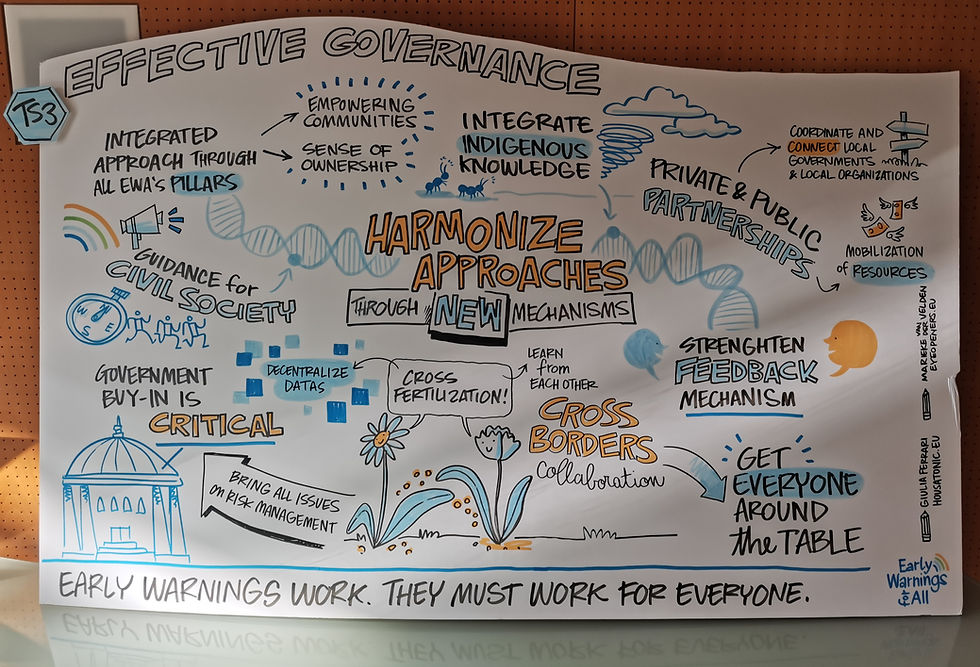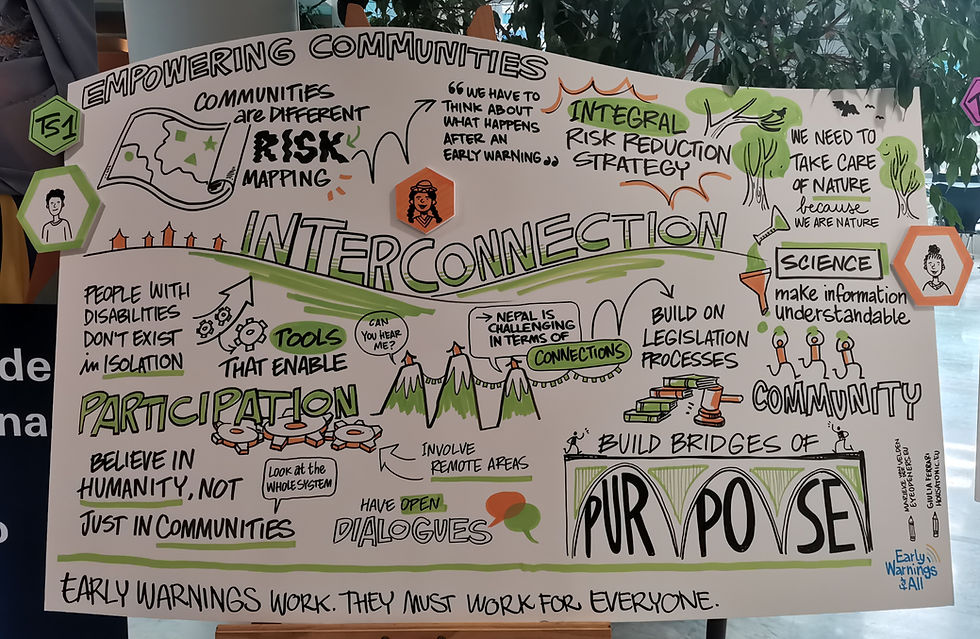Day Two of the Global 'Early Warnings for All' Multi-Stakeholder Forum 2025, Geneva
- Sally Potter
- Jun 4, 2025
- 6 min read
Tuesday was day two of the Global ‘Early Warnings for All’ Multi-Stakeholder Forum here in Geneva. The second of a two-day event, this preparatory forum precedes the 8th Session of the Global Platform for Disaster Risk Reduction, for which the opening session was also held on Tuesday afternoon.
To get the overview of day one, check out my previous post here.
Here are the key points I took away from the early warnings forum.
The value of science and innovation

The value of science, including the social sciences, was emphasised as being an incredibly vital part of effective warning systems. The scientific evidence underpins every part of the warning value chain/cycle – from the observations, modelling and forecasting, to the communication and behavioural response to the warnings. See my previous post here on the warning value cycle.
“We must invest in the entire warning value cycle”
– Secretary-General of the World Meteorological Organization, Prof. Celeste Saulo
This is why it is so important that funding should be retained (or even better, increased) for not only the technical observations and monitoring of our hazards and impacts, but also for the ongoing support of models that are required to produce forecasts, for research on aspects that underpin those models, for risk and engineering, and of course the social sciences. Integrating knowledge systems, including between scientific disciplines, with indigenous knowledge, local knowledge, and transformative artificial intelligence solutions, is crucial for innovation.

These risk mitigation solutions, which include taking actions based on the forecasts and warnings themselves rather than waiting to respond to the disaster, will save the New Zealand economy a huge amount of money.
While there can be a tendency to be technical and the contexts can be complicated, the warning systems and warnings themselves should remain as simple and understandable as possible.
“Although our work may be technical, our purpose is people”
– Mr Jagan Chapagain, CEO & Secretary General of the International Federation of Red Cross and Red Crescent Societies (IFRC)

Financing Early Warning Systems and sustainable development
Challenges and solutions were discussed relating to financing multi-hazard early warning systems and anticipatory action, and how to achieve sustainable impact in development projects given their finite time period, and in some places their fragile and conflict settings.
The issue here is that official development assistance is given on a project time scale – often just a few years. National governments receiving the assistance may not be able to sustain any impacts the project achieves due to the local political situation and ongoing funding constraints.

Solutions suggested by delegates included ensuring the projects are co-financed, rather than just receiving funding from a single source. This helps the government have ownership of the system. Ensuring there is adequate awareness about what projects are happening in the country helps with coherence and alignment to avoid double ups and overlaps.
Looking for a co-operative approach at the regional level can also help with cost-effectiveness. (New Zealanders, note that internationally the term ‘regional’ generally means groups of neighbouring countries (such as southeast Asia, or central Europe), rather than the use of the term as we use it – others call this the ‘provincial’ level.)
Scaling up financing from the project level (such as those financed by the Climate Risk & Early Warning Systems, or CREWS project) using initiatives such as the Green Climate Fund was also seen as a solution for longer term support. I have just been evaluating a CREWS project that was taking place in Cambodia and Lao PDR and saw the benefits of this work myself in achieving impact for their flood and drought warning systems.

Attracting private sector funding was another solution for sustainable development. An example given was how the Finnish Meteorological Institute has a partnership with a local private company, Vaisala, to produce tailored weather forecasts and collaborate on development projects. Finland’s Under-Secretary of State for International Development in the Ministry for Foreign Affairs, Mr. Pasi Hellman, said that to attract private sector financing, you need to have good infrastructure in place, skilled labour, and good legislative frameworks.
“Investing in early warning and early actions is extremely profitable”
– Lars Andreas Lunde from the Norwegian Agency for Development Cooperation
It was also suggested by a panelist that simplifying names – currently almost entirely acronyms - of the UN system and funding bodies could also help with increasing understanding and transparency.
Partnerships
Inclusiveness in warnings systems and multi-stakeholder partnerships were discussed.
“Early warnings for all is the vision, early warnings by all is the vehicle”
– Director of UNDRR, Ms Paola Albrito

We were reminded of the discussions on inclusiveness from day one of the forum. This was extended to working with stakeholder partners for effective warnings.
I had an interesting conversation with people from GeoSphere Austria later in the day and heard about their partnership approach. They have calls with a wide range of stakeholders (such as scientific institutes, emergency managers, emergency services, health and so on) once or twice a week, every week, even if there are no events happening. This grows trust and relationships and gives the opportunity for even small, slow building events to be shared and discussed. I think this is a great example, and GeoSphere Austria would be a good institute for New Zealand to engage with in future as the New Zealand Institute for Earth Science is put together and the various warning systems (hopefully) aligned.

Reflections on the forum
“The Early Warnings for All initiative is bringing everyone together. It is not political, it is about the people… It is up to us to take action”
- Mr Jagan Chapagain, CEO & Secretary General of the IFRC
There is not much time left in the Early Warnings for All by 2027 initiative, the Sendai Framework for Disaster Risk Reduction (2015 – 2030) or the UN Sustainable Development Goals (by 2030). This brought a sense of urgency from speakers in line with the theme of the Global Platform, of ‘Every day counts. Act for resilience today’.
As this forum was designed as a high-level dialogue for delegates with a range of backgrounds, it can be difficult to sift through the words to find the meaning and identify anything new – something that several people mentioned to me during the day.
However, I think we can fall into a bubble where we assume everyone in the sector knows these key themes for warnings, of the importance of partnerships, inclusiveness, and scientific evidence. But I still regularly encounter people who have the legal responsibility to give warnings that do not attend such forums, or know about those themes, or indeed see the value of acting on warnings at all, preferring to wait for the certainty of the response phase.
So, I think it is imperative that we remind ourselves of these important themes and ensure we are actually carrying them out in our day-to-day jobs, engaging with the right people at the right time, every time. And that we champion this message in other forums where people are not aware of the themes.
Forums such a this are quite different to standard academic conferences; they are all about helping other people, rather than sharing one’s own research.
“Behind every warning is a family preparing to evacuate, a farmer determining about crops, principals deciding whether to close their schools. Real people. Real lives. Real smiles”
– Prof Celeste Saulo, SG WMO

For the next three days I’ll be at the Global Platform – the main event for the week. I expect there will be more of the same themes. I look forward to hearing about some of the specific examples of how multi-hazard warning systems have been effectively developed, learn new monitoring and evaluation techniques, and workshop tools and exercises, and see old and new friends. Please reach out if you're there!




What an insightful post on the Global Early Warnings for All Multi-Stakeholder Forum! It’s inspiring to see such global collaboration in action. By the way, for anyone interested in exploring more thought-provoking work, be sure to check out this Book series by a talented author. You can also visit the Author website to learn more about upcoming releases and more. Looking forward to more updates from the forum!
This recap really highlights the importance of inclusive partnerships and innovation in building effective early warning systems — it’s inspiring to see communities, scientists, and policymakers converge around a shared purpose. Forums like this show that global challenges can be tackled when people connect and share knowledge. Something that struck me was how visibility — whether of critical information or of local services — is essential for impact. Just as emergency systems need to be easy to find, small businesses need platforms that help them be discovered. That’s why it’s crucial for enterprises to Get Listed Today in a strong Local business directory — it ensures communities can find the support and services they need when they need them most.